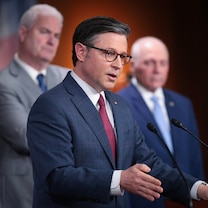Iraqi Leader Rips U.S. Critics Clinton, Levin
Nouri al-Maliki rips Dems who called for his ouster as withdrawal debate grows.
Aug. 26, 2007 — -- Iraqi Prime Minister Nouri al-Maliki is suffering from a growing crisis of confidence among his longtime allies in Washington.
With sectarian killings nearly doubling over the past year, Maliki failed to persuade Iraq's parliament not to take the month of August off, as President Bush had urged him to do. Democratic Sen. Hillary Clinton, D-N.Y., and Senate Armed Services Committee Chairman Sen. Carl Levin, D-Mich., have called for his ouster.
Today, Maliki struck back, saying the senators "consider Iraq as if it were one of one of their villages," and adding, "They should come to their senses."
Now, it is Republican allies of President Bush who are calling Maliki a failure.
"The Iraqi government is still pretty much of a disaster," said Sen. Mitch McConnell of Kentucky, the Senate Republican leader, on "Fox News Sunday."
Sen. John Warner of Virginia, the ranking Republican on the Senate Armed Services Committee, went further.
"The surge has made some positive gains," Warner told reporters. "At the same time, the partnership that we formed with the Maliki government has failed. … We did our job. The troops did their job. Maliki has let down the American forces, the coalition forces, indeed the president, with not carrying through with his part of the bargain."
Warner, who said last week that the withdrawal should start by Christmas, now says he might support a Democratic proposal to order troop withdrawals unless President Bush sets his own timetable soon.
"Sen. Warner is advocating the withdrawal of forces in order to put more pressure on the political process and make clear to Prime Minister Maliki that U.S. support is not unlimited," said retired Gen. William Nash, an ABC News consultant and senior fellow at the Council on Foreign Relations with experience in Iraq, Bosnia and Kosovo.
The main complaint of Maliki's critics are that he has failed to unite Iraq's warring Sunni and Shiite Muslims, is too closely allied with Iran and has enabled Shiite militias to dominate Iraq's government and security forces.




